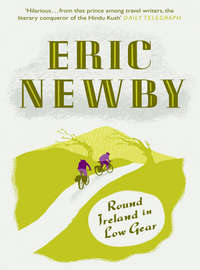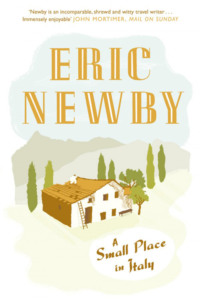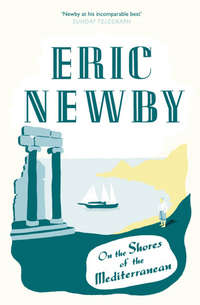
Полная версия
Love and War in the Apennines
‘I say, this is rather strong,’ Michael said after tasting it. ‘What do you think it is?’
‘It’s supposed to be Marsala, but the wine merchants in the camp say they’ve never tasted Marsala like this. And I’ve just met someone on the way here who was drinking it out of an enamelled jug and the enamel’s coming off.’
‘Could you remember to put all my socks in my pack and my pullover and The Tour of the Hebrides,’ I said. ‘Otherwise, I mightn’t finish it before we go home.’
What we did not know, how could we, was that the Allies’ dispositions were already made, and that none of their plans included the liberation of the occupants of the orfanotrofio. The assault convoys bound for Salerno were at sea and had already been sighted south of Capri. The Sixteenth Panzer Division which was in the area had already ordered a state of alarm, and its members were now engaged in disarming all Italian troops and taking over the coastal batteries. The only airborne operations which had been planned, a drop on Rome by the United States Eighty-Sixth Airborne Division, had already been cancelled after its deputy commander, who had arrived in the capital on the afternoon of the seventh on a secret visit, had found on the morning of the eighth that all the airfields were in German hands. It was he who told Badoglio that the main Allied landings were due to begin the following morning, the first that the Marshal or any of his staff had heard of it. They had been led to believe that no landings would take place until the twelfth. What difference it would have made no one will ever know, or care.
For the rest, the greater part of the British Eighth Army was committed in Southern Italy where it was fighting its way up through Calabria in order to link up with the troops which were to be landed at Salerno. There were not going to be any airborne landings at Milan or anywhere else and no seaborne ones at Rimini or Genoa either.
CHAPTER FOUR The Ninth of September
Late on the following morning an Italian bugler sounded three ‘g’s’, the alarm call which meant that the Germans were on their way to take over the orfanotrofio, and everyone began to move out of the building into the exercise field at the back. From the window of the hospital, of which I was now the only occupant, Michael’s boil having burst during the night, brought to a head, perhaps, by the events of the previous day, there was no one to be seen on the road; only Italian soldiers setting up machine-guns and scurrying into slit trenches, reluctantly preparing to carry out the colonello’s order to defend the camp to the last round and the last man.
Looking at them I knew that they would not do so. By this, the fourth year of the war, too many personages too far from the scenes of the battles which they were trying to control, without themselves being under the necessity of firing a shot or of laying down their lives, had issued too many such orders to too many troops who invariably ended up by having to lay down their arms ignominiously, in order to save their skins. These Italian soldiers would have been mad to die in defence of an empty building, and they didn’t.
With my pack on my shoulder I hopped through the deserted corridors towards the back door. On the way, amongst the debris on the floor, I found a little book with the Italian tricolore on the cover, entitled ‘Say it in Italian’, or something similar, and I picked it up. By the time I reached the corner of the field where the rest of my company were, they were just beginning to move off through one of the several gaps which had been cut in the wire.
There, the two parachutists were waiting for me. They looked enormous in their camouflaged smocks, in which they must have been roasting, but without which any parachutist feels naked. They had been relieved of their packs so that they could help me.
They told me to take it easy and we went out through one of the gaps in the wire in the sweltering midday heat, and as soon as we were beyond it one of the British orderlies in the camp, a small, nut-brown man, a trooper in some cavalry regiment, came up and said, ‘It’s all right. You got a horse! Name of Mora, quiet as a lamb.’ And there she was, standing with a stolid-looking Italian soldier in the shade of some vines, taking mouthfuls of grass, swishing her tail at the flies, looking contented and well-fed. She was a little horse.
The parachutists were delighted to have my weight off their shoulders. They hoisted me into the saddle, half-strangled by my pack strap which was twisted round my neck, and then the soldier led Mora forward, chewing a straw, happy to be seconded for this easy duty, free of the obligation to sell his life to no purpose, while the rest of the people in our company moved on ahead in the shade of the vines, picking great bunches of grapes and churning the earth into dust.
For me the journey was a nightmare. Although the country was dead flat it was intersected by irrigation ditches (the same ditches that the escapers who had had themselves buried in the field had spoken of with revulsion after they were re-captured). The last thing one wanted in such country was a horse. The last thing I wanted anywhere was a horse. All I knew about horses was derived from a couple of ruinous visits to some trotting races at Heliopolis. I had never been on a horse in my life and I was terrified of them. And every horse I met knew it too.
At the first ditch Mora stopped dead on the edge of it and refused to move backwards or forwards, more like a mule than a horse. Perhaps she was a mule. She took no notice of the blows which the Italian soldier was raining on her behind with a cudgel; and I was no help at all. Every time my damaged foot touched her it was agony.
We seemed destined to remain there for ever, but something happened to make her utter a terrific snorting, whinnying noise, rear up on her hind legs and come down with her front ones in the slime in the bottom of the ditch with a resounding splosh, which catapulted me over her head on to the far bank and hurt my ankle dreadfully.
‘Bloody funny, that Iti must have struck a lighted cigarette up her chuff,’ someone said.
‘One way of crossing the Rubicon,’ someone else said who had had a different sort of education. Everyone who witnessed it was cheered by this spectacular happening.
Then the parachutists picked me up and lugged me over a whole series of similar ditches while Mora, who had crossed them unencumbered, waited for me to catch up.
Finally, we emerged on to a narrow lane. In a field to one side of it men and women wearing wide-brimmed straw hats were harvesting wheat with sickles. They stopped work as the head of the column approached and looked alarmed, but when they realised that we were unarmed prisoners from the camp they smiled and waved to us.
Then a man in a striped city suit with square shoulders appeared and spoke to one of the Italian interpreters who was with us, and we halted in the shade of a grove of tall poplars. No one spoke and it was very cool and quiet. The only sound was the humming of bees and insects and the wind stirring the tops of the trees. High above them in a dark blue sky, small puffs of cloud floated, as if of a cannon that had been discharged at regular intervals. After some minutes we moved on again. None of us, except the interpreter and the more senior officers at the head of the column, knew what the man in the striped suit had said. None of us really cared. We were not yet used to the idea of freedom. Although we each one of us still felt that we were individuals, we were really a herd lacking any power to make useful decisions, and although we were in theory a battalion organised in companies of a hundred or so, any one of these companies could probably have been re-captured in this moment by two or three resolute Germans armed with Schmeissers. We were rather like one of those outings of lunatics which I had so often encountered in the Surrey pine woods when we had been training in the first summer of the war. And like many of them we were irrationally happy. Even I on my horse, or mule, of which I was terrified.
Then, suddenly, there was an awful roar and the Italian soldier was trying to drag Mora into a deep, watery ditch, and I clouted him over the head with his cudgel, of which I had relieved him, harder than I needed to in revenge for his having stuck a lighted cigarette end up Mora’s backside, as a Messerschmidt 110 skimmed overhead, two hundred feet above us, silvery, like a flying fish in the sun. It was gone before we had time to hide ourselves, and then it didn’t seem to matter much whether the pilot had seen us or not.
With so many stops and starts it took us until early afternoon to reach our destination, some fields on the far bank of one of the torrents which roared down from the Apennines at certain seasons, now with hardly any water in it at all. Here, below one of the steep, grassy embankments, we lay down under the vines and waited, dozing and discussing the various rumours that came to us, no one seemed to know from where: that the Germans had arrived at the orfanotrofio with tanks, that they were looting, were drunk, were smashing everything, had gone away for good, had gone away and were coming back the next day to round us up.
What had actually happened was that some lorryloads of Germans, probably feldgendarmen, military policemen, had arrived at the camp, had fired a few rounds in the air, the Italian soldiers had capitulated instantly, the colonello had been arrested, and the Germans had taken him away as a souvenir of their visit. Later he was sent to a concentration camp in Germany where he suffered such privations that he died soon after he returned to Italy at the end of the war. He was an honourable, gallant but rather stupid man – honour being as much use in dealing with Germans in war time as a peashooter would be to a prehistoric man attempting to destroy a mammoth. The only looting was being done by the inhabitants of the village. It was lucky for us that they were.
Then the colonel sent for me. After a lot of frenzied hopping I found him hidden away behind a line of vines, together with his staff.
‘I’m afraid you’ll have to get under cover,’ he said. ‘We may have to move at any time and I can’t ask the chaps who have been helping you up to now to jeopardise their own chances of getting away in order to save you. Bad luck, but there it is. We’ve arranged with a farmer in that house over there to let you hide in his hay, but if the Germans find you he won’t know anything about you being there. If they do come it will be every man for himself, anyway.’
At the farm I said goodbye to the Italian soldier. If I had been a horse lover I would have said goodbye to Mora too. I gave him one of my six packets of cigarettes and we shook hands.
‘Vado a casa,’ he said. ‘I am going home.’ Then he got into the saddle and set off southwards along a line of vines, away from the colonel and the prisoners and the camp, a squat, rectangular figure. I wonder whether he made it. I expect he did. He was an invisible sort of man who blended well with the landscape. If I had had any sense I would have got up behind him and ridden pillion.
The farmer was a large, red-faced man with a roman nose. He was like a bucolic emperor, but his florid appearance belied his character which was shy and retiring. I was glad of this because I was not capable of making any sort of conversation. All I knew was a number of words – buono, male, oggi, domani, bello, brutto and some sentence which had stuck in my memory from the official communiques, Due velivoli sono stati abbattuti, two aeroplanes have been shot down, Un piroscafo è stato colato a picco, a steamer has been sent to the bottom, not much use in everyday conversation.
He helped me up a couple of steep ladders to a big loft where I lay deep in the hay with a bottle of water to slake my thirst, sneezing and with streaming eyes, wishing that I was in England where, for me, the hay fever season would have been over, and soaking the only two handkerchiefs I had with me.
Through a large opening in one of the walls of the loft, I looked out over a vast sea of vegetation to an infinitely distant horizon, from the surface of which, as if the lower parts of them were engulfed by it, rose red-roofed farmhouses, the tall campaniles of churches and dark groves of poplars. Much closer, a couple of hundred yards away, occasional movements among the vines betrayed the presence of scouts posted by the colonel, who were somewhat out of practice, otherwise there was no sign that there were more than five hundred prisoners hidden among them.
From away to the south, where the Via Emilia ran through the plain, came the solid roar of transport on the move. From somewhere closer came the pooping sound of motor cycles. They would probably be German B.M.W.s with sidecars, carrying three men armed with grenades and machine pistols. A few of these units could pick the lot of us up. They were probably using one of the minor roads which we had sometimes got to on our walks which ran roughly parallel with the Via Emilia from Piacenza to Parma and they were probably doing this because there was so much traffic on the main road. I wondered which way they were going, coming in from the north or pulling out across the river. The Italian Area General was said to have telephoned the colonello just before we left and told him that there was fighting in Milan where American parachutists had landed, and that there had been seaborne landings at La Spezia on the west coast. I didn’t believe any of this; but I still clung to the irrational belief that everything would be all right if only we could see the night through.
When it grew dark the farmer, whose name was Merli, came up the ladder and signed to me to come down. I was glad to get out of the fienile, the loft, although my hay fever had gone at last.
His wife was dark and pale and slight. The two children were beautiful, miniature editions of their mother. They were all curious about my uniform, the whipcord trousers, the battle-dress jacket with the polished brass pips, my silk muffler and my one beautiful new boot (the other was in my pack). Like everyone else, I was wearing my best clothes, wanting to appear decent when our own troops arrived. She fed me on pasta asciutta, and what she called grana, what I called Parmesan. It was nothing like the cheese of that name I had eaten in England. Afterwards she gave me a piece to eat. It had hard, salty nodules in it, the curd which broke into small pieces when the cheese was made. And her husband gave me some frothy, purple wine to drink, called lambrusco, which was very refreshing.
Then one of the Italian interpreters appeared, the elegant, pipe-smoking capitano who spoke excellent English. The news he brought was not altogether good.
‘The Germans are coming in from the north,’ he said, ‘and in great strength. But they may have left it too late. There’s been a big Allied landing at Salerno, south of Naples. We’ll know better what to do tomorrow.’
While we were sitting on chairs in the yard talking about the place where he lived, an extraordinary great vehicle, which in the moonlight looked as big as a barn, came charging round a corner belching sparks and smoke and disappeared.
‘What on earth was that?’ I asked him.
‘That was the steam tram that goes from Busseto to Parma by way of Ponte Taro,’ he said. ‘I’m surprised it’s out on such a night as this.’
I found it strange sitting with someone who up to a few hours before had been an official enemy. Like the soldier who had been put in charge of Mora, the capitano had been lucky to have been given the job of looking after us instead of being called upon to make a last stand at the orfanotrofio. I asked him how long he thought it would be. He said a week at the most. I noticed how the time from liberation was rapidly receding.
‘Now go and sleep,’ he said. ‘The farmer has put some sacks in the cowshed for you.’
Then he went off, into a dark mist which had risen. It hung just above the ground so that his head and shoulders emerged above it and the lower part of his body was invisible as he walked away. It was a weird sight. The moon was sinking, shedding an unearthly reddish tinge on the misty plain. Against the dark line of the Apennines Verey lights rose at intervals. From time to time there were explosions at the foot of the hills as if dumps were being blown. On the Via Emilia the traffic roared. Altogether, it was a thoroughly macabre night.
CHAPTER FIVE Interlude in an Ospedale
The next morning, after a slow start, things began to happen with increased rapidity. It was as if a piece of an old film in which the actors emerge from vehicles, zoom into buildings with incredible speed, and miraculously appear at a window sixteen storeys up within seconds, had been interpolated in a modern one in which the characters move at a normal rate.
Around eleven o’clock an Italian doctor arrived in a Fiat 500. He was an enormous, shambling man with grizzled hair, like a bear and one of the ugliest men I had seen for a long time.
He examined my ankle, which was rather painful after the strains to which it had been subjected, raised his shoulders, made a noise which sounded like urgh and went off to have a conference with the capitano.
‘The doctor says you must go to hospital,’ the capitano said, when they emerged from their conclave.
‘But that means I shall be captured again,’ I said.
‘You’ll be taken anyway if you don’t. Apparently things are not going too well at Salerno and we’re six hundred kilometres north of it. Everything’s going to break up here, anyway. Unless you can walk you won’t stand a chance. The doctor can get you into a hospital in Fontanellato. No one will think of looking for you there.’
While he was speaking, the forerunners of an army of women, girls and small boys began to arrive at the farm on foot and on bicycles; the same girls, or the same sort of girls I had seen on the road outside the camp, except that now they were wearing their working clothes. I felt less bold now that we were at close quarters and there was no wire between us, and so did they, and all we managed were some nervous smiles.
They all carried baskets and panniers filled with civilian clothing, wine, bread, cheese, fruit, eggs and tinned food and cigarettes which they had saved from the orfanotrofio after the Germans had left and all at once the farm became a depot for the prisoners hidden behind the embankment.
I found myself a mechanic’s jacket and a pair of dark blue cotton trousers and a shirt, filled my pack with the food and cigarettes that were being pressed upon me from every side, and once again climbed the ladder to the loft where I changed into them, chucking my uniform down from the window into the yard from which it was instantly taken away.
While I was doing this I noticed a bold, good-looking girl. She was different from the others. They were all brown or black haired; but she was an ash blonde with blue eyes and she was very slim which made her seem taller than she was. She looked more like a Scandinavian than an Italian to me, but with more fire. Whatever she was she smiled at me.
Then the doctor arrived. For the last time I descended the ladder and said goodbye to the farmer and his wife who cried. They were the first people in the whole district to take the risk of helping us. Then I hopped across the yard to the Fiat.
As I was getting into it the girl came up and leant over the top of the open door.
‘I vill com to see you in the ospedale,’ she said, in fractured English. She had a deep middle-European voice. ‘Wonce I have seen you in the orfanotrofio and you vaved and the soldati went pom pom. Ve vill have lessons in languages,’ she said. ‘Your language and my language.’ And she smiled again. Then someone shut the door and we drove away.
‘If iu uont tu enter dhe steiscen iu mast haev e plaetfom tikit,’ Wanda said. ‘Se vuole entrare nella stazione deve avere un biglietto.’
I was lying in a bed in the Ospedale Peracchi on the outskirts of Fontanellato, only a few hundred yards from the orfanotrofio. I had now been free for three days. It seemed much longer. Wanda was seated on a chair which one of the suore, the nuns who were also expert nurses, had placed in a corner of the room, as far away from me as possible. Equally discreetly, the door had been left wide open. Both of us were armed with phrase books, she with a large Italian/English version, I with the English/ Italian booklet which I had salvaged on my way out of the orfanotrofio. With their help we were making heavy weather of one another’s languages, and it was not fair of her to change subjects like this.
Up to now we had been reading useful phrases to one another from the chapters on ‘Trams and Buses’. ‘Last stop. Ool ghet aut!’ ‘Kwah-lee ow-toh-bus vann-oh ah Toh-reen-oh? Which buses go to Turin?’ I ruffled through the pages of my book which was so small that it looked as if it had been printed for a midget, until I found a section headed ‘At the Station – Alla Stazione’, and said, ‘Oh per-soh eel mee-oh beel-yet-oh. I have lost my ticket.’ To which she replied, severely, ‘Iu haev misleid iur tikit. Iu caant continiu iur geerni anless iu ricaver it. Lei ha smarrito il suo biglietto. Non può proseguire il suo viaggio se non lo trova.’
‘Nohn vawr-ray-ee cohn-teen-u-ar loh. I don’t want to continue it,’ I said. I enunciated this, and all the other phrases, with such painstaking slowness that I sounded like a run-down gramophone.
‘Iu hev mist dhe train. È partito il treno,’ she said, triumphantly, like one of the White’s men in the orphanage putting down a natural at baccarat.
‘Grahts-ee-ay. Lay ay stah-toh jehn-tee-lay. Thank you very much. Most kind of you.’
‘Rieli nathing,’ she said, airily. ‘Ai em ounli tu glaed if ai kaen help iu. Proprio nulla, per me è un vero piacere poterla aiutare.’
She shut her book and looked at me with an air of despair which, to me, was very beautiful.
‘Hurrock,’ she said (this is what my name sounded like on her lips).
‘You will never learn italiano like this. You spik and then you forget. First you must learn la grammatica. I have learned English grammatica, so also must you learn Italian. And you must learn presto, queekly, queekly. Here, you see, I have written for you a grammatica with aggettivi, come se dice?
‘Adjectives! Adjectives! Che lingua! Also auxeiliary verbs and verbs, regolari and irregolari. You will learn all these, please, by tomorrow.’
‘I can’t learn all this by tomorrow.’
‘You vill,’ she said, ‘or I shall not kom more. I shall teach to someonels. The superiora says I can kom ven I vish. If you vont me to kom you must vork.’
She consulted her book, ‘Hueer dheers e uil dheers e ui. Proverbio. Dove c’è la volonta c’è la via.’
‘Where there’s a will there’s a way,’ I said. ‘That’s a proverb. I want you to come to see me more than anything.’
‘Then learn your grammatica,’ she said, consulting her superior phrase book. ‘Far presto! Luk slipi!’
When the doctor drove me to the hospital he made me sit next to him in the front seat. It seemed insanely risky, but the lanes through which we whizzed were as empty as the fields on either side. It was midday, mezzogiorno, and everyone, friend and foe, was under cover, eating their dinners and sheltering from the gigantic sun. Behind us a long plume of dust rose from the road and spread out across the countryside as dense as a smokescreen laid by a destroyer.
At the hospital we were expected. As soon as I got out of the car in the forecourt, two astonishingly powerful women wearing black habits and starched white head-dresses, whom I took to be nuns, came running down the steps towards me, flung my arms round their shoulders, just as the two parachutists had done, and rushed me into the building under a dilapidated iron and glass canopy, like the ones outside old cinemas, with the words Ospedale Peracchi above it, through a pair of mahogany doors, down a dim corridor in which there was a bust of Signor Peracchi, the benefactor, after whom the hospital had been named, and into a hall in which they paused for breath. To me they seemed tough enough to be members of one of those German parachute units whom everyone at the time believed had dropped, dressed as nuns, in the Low Countries, in 1940.









